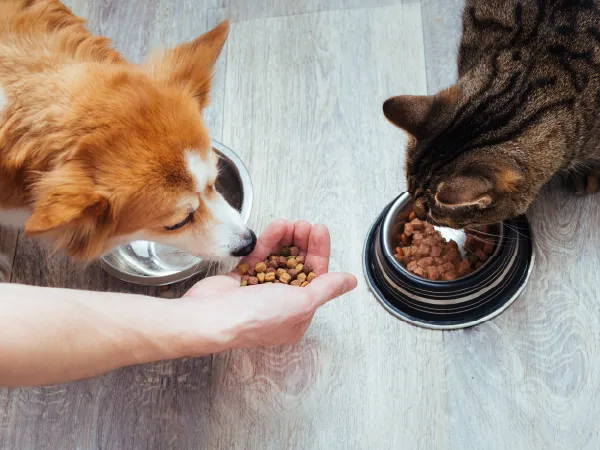Proper nutrition is the cornerstone of your pet’s health. Just like humans, pets require a balanced diet to thrive
1. Essential Nutrients for Pets
Proteins: Proteins are the building blocks of your pet’s body, essential for muscle growth and repair. Good sources include meat, fish, eggs, and some plant-based options like lentils.
Fats: Fats provide energy and support cell function, skin health, and coat quality. Key sources are fish oil, flaxseed oil, and animal fats.
Carbohydrates: Carbohydrates supply energy and support digestive health. Include grains, vegetables, and fruits in your pet’s diet.
Vitamins and Minerals: Vitamins (A, D, E, K, B-complex) and minerals (calcium, phosphorus, zinc) are crucial for various bodily functions, including immune support and bone health.
2. Life Stage Nutrition
Puppies and Kittens: Young pets need more calories, protein, and fat to support their rapid growth. Choose food specifically formulated for puppies or kittens.
Adult Pets: Adult pets require a maintenance diet with balanced nutrients to support their activity levels. Adjust portion sizes to maintain a healthy weight.
Senior Pets: Older pets may need fewer calories but more fiber and joint-supporting nutrients. Look for senior pet formulas with these adjustments.
3. Special Dietary Needs
Food Allergies and Sensitivities: Some pets may have allergies to certain ingredients like wheat, soy, or specific proteins. Look for hypoallergenic diets or limited ingredient diets if your pet shows signs of allergies.
Weight Management: If your pet is overweight, consider a low-calorie diet and increase their exercise. Portion control is crucial for weight loss.
Digestive Health: For pets with sensitive stomachs, choose easily digestible foods that include probiotics and prebiotics to support gut health.
4. Homemade vs. Commercial Pet Food
Homemade Pet Food: Making your own pet food allows you to control the ingredients, but it requires careful planning to ensure a balanced diet. Consult with a vet or a pet nutritionist.
Commercial Pet Food: High-quality commercial pet foods are convenient and nutritionally balanced. Look for brands with natural ingredients and no artificial additives.
5. Feeding Guidelines and Tips
Portion Control: Follow feeding guidelines on pet food packaging and adjust based on your pet’s activity level and health. Avoid overfeeding to prevent obesity.
Regular Feeding Schedule: Maintain a consistent feeding schedule to regulate your pet’s digestion and prevent overeating.
Hydration: Ensure your pet has access to fresh, clean water at all times. Hydration is crucial for overall health.

